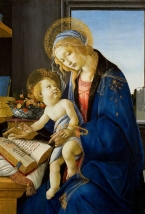Birth of the Christ
- Historical Short Story
- Views (2,697) Comments (0)
BIRTH OF THE CHRIST
CHAPTER.... 1
Since we are to discuss the natality alone, let's start from the scratch. Though I don't really know much about it, but this is my promise. Rectify my wrongs as an expert and let me know please. thanks for often support.
The birth of Jesus Christ can be traced to Genesis 12:1-3
where the LORD said to Abram,
“Go forth from your country,
And from your relatives
And from your father’s house,
To the land which I will show you;
And I will make you a great nation,
And I will bless you,
And make your name great;
And so you shall be a blessing;
And I will bless those who bless you,
And the one who curses you I will curse.
And in you all the families of the earth will be blessed.”
and also a in the book of Isaiah, a man who has lived in about seven hundred years before the birth of Jesus has forecasted the birth of the Christ saying in his book chapter 9 vs 6
For to us a child is born,
to us a son is given,
and the government will be on his shoulders.
And he will be called
Wonderful Counselor, Mighty God,
Everlasting Father, Prince of Peace.
Also in Micah 5 vs 2
But you, Bethlehem Ephrathah,
though you are small among the clans of Judah,out of you will come for me
one who will be ruler over Israel,
whose origins are from of old,
from ancient times.”
When King Herod heard this he was disturbed, and all Jerusalem with him
When he had called together all the people’s chief priests and teachers of the law, he asked them where the Messiah was to be born.“In Bethlehem in Judea,” they replied, “for this is what the prophet has written:
“‘But you, Bethlehem, in the land of Judah,
are by no means least among the rulers of Judah;
for out of you will come a ruler
who will shepherd my people of Israel.
A man called Nephi also lived 600 BC also saw some facts in his vision and revealed it to his people about the oncoming saviour.
Nephi sees the Spirit of the Lord and is shown in vision the tree of life—He sees the mother of the Son of God and learns of the condescension of God—He sees the baptism, ministry, and crucifixion of the Lamb of God—He sees also the call and ministry of the Twelve Apostles of the Lamb.
A prophet about the signs of Jesus’ birth. A new star would appear, and the night before Jesus would be born it would not get dark. {Helaman 14:2}
For behold, did not Moses prophesy unto them concerning the coming of the Messiah, and that God should redeem his people? Yea, and even all the prophets who have prophesied ever since the world began—have they not spoken more or less concerning these things?
5 And he also spake concerning the prophets, how great a number had atestified of these things, concerning this Messiah, of whom he had spoken, or this Redeemer of the world.
Jacob 4: 4.
4 For, for this intent have we written these things, that they may know that we aknew of Christ, and we had a hope of his glory many hundred years before his coming; and not only we ourselves had a hope of his glory, but also all the holy prophets which were before us.
Jacob 7: 11 (11-12)
11 And I said unto him: Then ye do not understand them; for they truly testify of Christ. Behold, I say unto you that none of the aprophets have written, nor bprophesied, save they have spoken concerning this Christ.
Alma 25: 16 (10-16)
16 Now they did not suppose that asalvation came by the law of Moses; but the law of Moses did serve to strengthen their faith in Christ; and thus they did retain a chope through faith, unto eternal salvation, relying upon the spirit of prophecy, which spake of those things to come.
In a prophecy about the coming of the Savior, the Nephite High Priest Alma said, “And behold, he shall be born of Mary, at Jerusalem which is the land of our forefathers” (Alma 7:10).1 Following a remark published in 1831 by Alexander Campbell, some readers have noted with no little amusement that the Book of Mormon seems to say that Jesus was born in the city of Jerusalem, not the village of Bethlehem. But in Alma’s statement to the people of Gideon, he spoke not of a specific town, but prophesied that Jesus would be born ator in the “land” from which Lehi’s family came.
The small town of Bethlehem is only about 8 miles from the center of Jerusalem, which was the political and religious capital of Lehi’s homeland. Bethlehem was known as the home of King David, but otherwise it was seen as an insignificant place in Lehi’s day. In fact, recent archaeological evidence suggests that within or close to Lehi’s lifetime, Bethlehem was a “satellite settlement” to Jerusalem. A fiscal bulla (clay seal impression) found in Jerusalem and inscribed with the name Bethlehem was discovered and dated to the 7th century BC, indicating that Bethlehem was “linked to the nearby city of Jerusalem” at this time.
Bethlehem would have been all the more insignificant to Alma’s audience in the Nephite land of Zarahemla. The Nephites cared little about the Davidic monarchy, and by Alma’s day they had been far away from the land of Israel for over 500 years. Thus, Alma would naturally have referred generally to the land where Jesus would be born and not to an obscure outlying suburb.
Moreover, referring to Jerusalem and its environs as a “land” was a proper geographical usage. For instance, it can be found in the El Amarna tablets in Egypt, which date to the fourteenth century B.C. These tablets were unknown in 1829 and were discovered in Upper Egypt in 1887, well after the Book of Mormon was translated and published. The ancient writer of these texts knew Akkadian and the affairs of the lands around Jerusalem. He referred to “the land of Jerusalem” in language similar to Alma’s. The ancient tablet reads:
“And now as for Jerusalem—Behold this land belongs to the king”
“But now even a town of the land of Jerusalem, Bit-Lahmi by name, a town belonging to the king, has gone over to the side of the people of Keilah.”
Helaman 14:3–5
Corrupt judges seek to incite the people against Nephi—Abraham, Moses, Zenos, Zenock, Ezias, Isaiah, Jeremiah, Lehi, and Nephi all testified of Christ—By inspiration Nephi announces the murder of the chief judge. About 23–21 B.C.
BIRTH OF THE CHRIST
CHAPTER... 2
When God's will was about to come forth, a female child was born by Joachim and Anne precisely 16 BC{this was said because she was a teenager when she gave birth to her first son Emmanuel} She was named Mary. Hence Mary may mean different things it depends on your language, on my way hunting for the meaning of this name, I saw this in an Urban dictionary Mary is a kind, caring, beautiful, stunning, and amazing girl that everyone has to fall in love with. She is committed to one guy only, and is very faithful. She is the best girl you'll ever have the pleasure of meeting in your life. Every time she enters the room suddenly you are filled with joy, and she is always able to put a giant smile on your face. She makes you feel at home, loved, and like there's no one else but you. She gets excited about everything, which brightens up your day, everyday. She likes to go on adventures and to make great memories and have fun! She loves to skate, to draw, to cuddle, watch ROM coms, eat strawberries, make forts, drink lemonade, be carried around, and be nice to every one. Despite how much she's been through, she's still the strongest and most amazing girl you'll ever meet. She is perfect in every way, but once you date a Mary, never let her go, because her perfect imperfections cannot be given up. She is an unforgettable girl, and not to mention hot! She is the best girl you'll ever meet in your life, and time stops every time you see her, because she is just so beautiful, and everything a guy could ever ask for.
But from the history related to this write-up, this name was said to be a Greek name Μαριαμ (Mariam) and Μαρια (Maria) - the spellings are interchangeable - which were from Hebrew ??????? (Miryam), a name borne by the sister of Moses in the Old Testament. The meaning is not known for certain, but there are several theories including "sea of bitterness", "rebelliousness", and "wished for child". However it was most likely originally an Egyptian name, perhaps derived in part from my "beloved" or my "love".
She was guided and protected to live a pious life by the Creator of the heaven and earth. For this she was so admired for her bravery and loved for her devotion to God, even though teenagers of her days do lost their vaginitis earlier than usual, she was a lucid contrast to them.
Mary was a remarkable woman. For one thing, she truly understood what it meant to sacrifice for the sake of doing God’s will, an example, her son Jesus, noted and would later follow. For example, apparently no one at that time, including she herself, was expecting the Messiah to be born of a virgin. This is why she asked the angel Gabriel how she was going to bear the Messiah when she was not married and sexually active. This confirmed in (Luke 1:34),Even though She knew that accepting pregnancy from God would cause turmoil and pain to her and her loved ones, yet she accepted God’s plan for her life, saying, “…Behold, I am the servant of the Lord; let it be to me according to your word…”(Luke 1:38)
One very remarkable thing about Mary is that she would almost certainly have been 12-14 years old when the angel Gabriel appeared to her. This was known because the common custom at that time was for girls to marry early, at that age. The Bible never gives Mary’s age when she got pregnant or gave birth to Jesus, and that is because when something happened that was common in the culture, nothing was said about it.
In ancient Israel, girls married in their teens, even early teens. For Mary to be betrothed (engaged) but not yet formally married, yet old enough to have and nurse the Messiah, she would have been 12-14. The Zondervan Pictorial Encyclopedia of the Bible points out, “It appears that both boys and girls were married very young. Later [after the New Testament period] the rabbis fixed the minimum age for marriage at twelve for girls and thirteen for boys.”
Marrying young was the custom in many ancient cultures. Two cultures that had particular influence on the biblical world were the Greeks and Romans. Isomachus, a character in the Greek writer Xenophon’s Oeconomics, mentions that when he married his wife, she was not yet fifteen.Roman girls also married very young, sometimes even before puberty.
So, in nut shell, it was between this above range that she was been visited by Angel of the Lord. After she has been engaged to Joseph, who was known as saint Joseph in the Bible. he was known as a carpenter though his work was a profession, but rather seen as Godly work then. Though the date wasn't really stated
but it was lucid at Luke 1: 26-38
The Angel Gabriel Comes to Mary
Six months after Elizabeth had become pregnant, God sent the angel Gabriel to Nazareth, a city in Galilee. The angel went to a virgin promised in marriage to a descendant of David named Joseph.
The virgin’s name was Mary.
When the angel entered her home, he greeted her and said, “You are favored by the Lord! The Lord is with you.”
She was startled by what the angel said and tried to figure out what this greeting meant.
The angel told her,
“Don’t be afraid, Mary. You have found favor with God.
You will become pregnant, give birth to a son,
and name him Jesus.
He will be a great man
and will be called the Son of the Most High.
The Lord God will give him
the throne of his ancestor David.
Your son will be king of Jacob’s people forever,
and his kingdom will never end.”
Mary asked the angel, “How can this be? I’m a virgin.”
The angel answered her, “The Holy Spirit will come to you, and the power of the Most High will overshadow you. Therefore, the holy child developing inside you will be called the Son of God.
“Elizabeth, your relative, is six months pregnant with a son in her old age. People said she couldn’t have a child.
But nothing is impossible for God.”
Mary answered, “I am the Lord’s servant. Let everything you’ve said happen to me.”
Then the angel left her.
BIRTH OF THE CHRIST
CHAPTER... 3
Joseph as a man had though of different types of negative things though he was doubting not proclaiming when he heard about the holy Spirit's pregnancy of betrothed wife. He thought maybe Mary has been unfaithful or being raped, also it maybe because he was afraid of marrying the holy Spirit's spouse since he was ordinary human being So he thought of divorcing her privately,because they were legally engaged{don't forget Crown-prince is not there} in the darkness of is doubt angel Gabriel shed light of truth to his mind in his dream
{Matthew 1:20} Joseph son of David, do not be afraid to take Mary home as your wife, because what is conceived in her is from the Holy Spirit. She will give birth to a son, and you are to give him the name Jesus, because he will save his people from their sins."
All this took place to fulfill what the Lord had said through the prophet: "The virgin will conceive and give birth to a son, and they will call him Immanuel" (which means "God with us").
As a pious man, he heard and yield to the voice of the Foremost.
It was likely early in the autumn of the year, so light rains were possible as the dry season gradually ended
when Mary's load was heavy, i mean the fruit in her belly.
When the roman statesman and military leader who was the first Emperor of the Roman Empire, controlling Imperial Rome from 27 BC Caesar Augustus decreed that a registration should be carried out in the land to conduct an enrollment for the purpose of taxation,and people had to travel to their town of origin in order to comply. Though she was not expected to travel in such condition but
Being Joseph’s wife made a great deal of difference in her decisions. She viewed her husband as her spiritual head, embracing her God-given role as his helper by supporting him in his decisions.
but looking into (Luke 1:46-55)When it came to the Scriptures, Mary was far from an ignorant girl. possibly she might have known that she was to give birth at Bethlehem.
{Mary’s condition might require numerous periods of rest. Now, of all times, a young woman might yearn to stay close to home, where she had family and friends who were ready to help when her birth pangs began. Without a doubt, she needed to have courage to take this trip}
As it's well known that they were both descendants of David,despite her condition she traveled from Galilee a city in Jerusalem to Judah in Bethlehem the city of David with her man, the about 100 kilometers journey Which took them up to five days
"Mary must have breathed a sigh of relief when she first caught sight of Bethlehem. As they mounted the hillsides, passing by olive groves?—among the last of the crops to be harvested—?Mary and Joseph may well have thought about the history of this little village. It was too insignificant to be numbered among Judah’s cities, just as Micah the prophet had said; yet it was the birthplace of Boaz, Naomi, and later David, all more than a thousand years earlier."
BIRTH OF THE CHRIST
CHAPTER... 4
when they got to Bethlehem there was no space for them in the guest room.{though some may say "inn" but as it is well known that the new testament was written in Hebrew, the word "Kataluma" means guest room as it was written. this can be confirmed where Luke use this same word in his book 22: 11,the actual word for inn in Hebrew is pandokheion. The linguistic evidence shows that Luke used the term kataluma to mean not an inn, but the guest room— indeed, “the” guest room (the definite article is used) of a particular house.}
Besides, for commercial reasons inns were usually found along the major roads. Yet Bethlehem was a small town in the upper mountains of Judea, and no major Roman road is known to have passed through it. Since it seems to have been an insignificant village at the time, it’s doubtful that an inn even existed there then.
This gives yet more reason to realize that what Luke really wrote is that there was no room in the guest chamber. Certainly, due to the Roman census being taken at the time and the huge number of people traveling to their birthplaces, available space in the guest quarters was scarce.
They have been in Bethlehem for days before she gave birth. Luke tells us plainly, “And Joseph also went up from Galilee, from the city of Nazareth, to Judea, to the city of David, which is called Bethlehem … And while they were there, the time came for her to be delivered” (Luke 2: 4-6).Joseph finds shelter among the livestock in plato's cave where her betrothed wife Mary goes into labor.
It would have been strange for Joseph to be alone with Mary for the birth of Jesus. Even though Joseph had great faith in God and trusted that Jesus was to be the Messiah, men at that time weren’t trained on how to deliver a child. Being an honest man, Joseph would have sought out help from a local midwife, realizing his lack of knowledge in that area. Added to this historical knowledge, an ancient text from the year 145 called The Protoevangelium of James tells the story of Mary’s midwife and another woman who assisted at the birth.
And I [Joseph] saw a woman coming down from the hill-country, and she said to me: O man, whither are you going? And I said: I am seeking an Hebrew midwife. And she answered and said to me: Are you of Israel? And I said to her: Yes. And she said: And who is it that is bringing forth in the cave? And I said: A woman betrothed to me.
And the midwife went away with him. And they stood in the place of the cave, and behold a luminous cloud overshadowed the cave. And the midwife said: My soul has been magnified this day, because my eyes have seen strange things — because salvation has been brought forth to Israel. And immediately the cloud disappeared out of the cave, and a great light shone in the cave, so that the eyes could not bear it. And in a little that light gradually decreased, until the infant appeared, and went and took the breast from His mother Mary. And the midwife cried out, and said: This is a great day to me, because I have seen this strange sight. And the midwife went forth out of the cave, and Salome met her. And she said to her: Salome, Salome, I have a strange sight to relate to you: a virgin has brought forth — a thing which her nature admits not of.
After she delivered safely, she Wrapped him in a swaddling clothes and Laid him in a manger.
Meanwhile, east of town among the rugged hills are those famous shepherds. An angel from heaven appears. The shepherds are, understandably, frightened. The angel says what angels always say — “Fear not.” This is what heaven has to say to earth…to humanity…to you: Don’t be afraid.
The angel announces good news of great joy. The Savior-King has been born in Bethlehem. Then more angels!
Glory to God in the highest!
And on earth peace, goodwill among men!
Before departing the angel gives the shepherds a sign to help them find the new born king: A baby wrapped in swaddling clothes lying in a manger. The manger bit, that’s the real clue. The shepherds won’t be looking for this baby in houses or inns, but in caves!
The good news of great joy is that the world’s true king has been born in Plato’s cave
THE END














